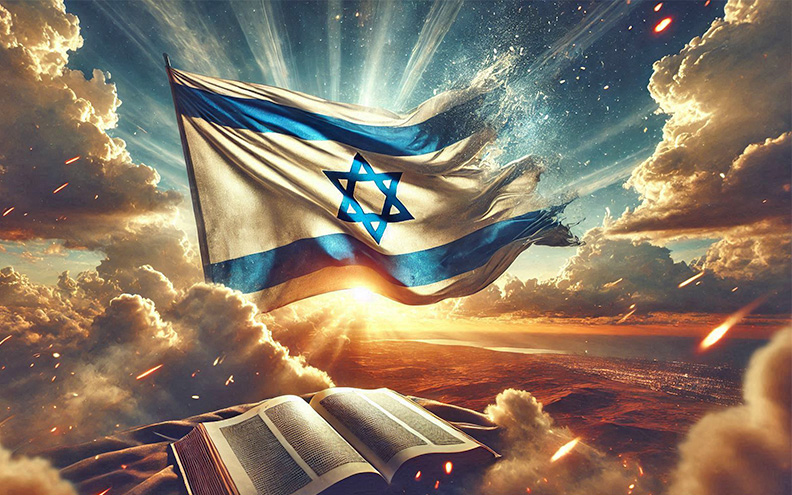The Church and Israel

Shalom, dear brothers and sisters! We are pleased to share with you Pastor Oren Lev Ari’s sermon titled “The Church and Israel.” This topic remains a stumbling block for many. Some argue that the Church has replaced Israel in God’s plan, while others elevate Israel above the Church. Today, we will look into God’s Word to explore the roles of the Church and Israel in His divine plan and what the future holds for them in light of the end times.
Let us begin by examining the place of the Church and Israel in God’s covenant. Let’s turn to the Bible and read the story of Naomi and Ruth: “In the days when the judges ruled, there was a famine in the land. And a man from Bethlehem in Judah, together with his wife and two sons, went to live in the country of Moab. The man’s name was Elimelech, his wife’s name was Naomi, and the names of his two sons were Mahlon and Kilion. They were Ephrathites from Bethlehem, Judah. And they went to Moab and lived there. Now Elimelech, Naomi’s husband, died, and she was left with her two sons. They married Moabite women, one named Orpah and the other Ruth. After they had lived there about ten years, both Mahlon and Kilion also died, and Naomi was left without her two sons and her husband. When Naomi heard in Moab that the Lord had come to the aid of His people by providing food for them, she and her daughters-in-law prepared to return home from there” (Ruth 1:1–6).
This story carries deep symbolic meaning. Why did Naomi decide to return to Israel? Because she heard that “the Lord had come to the aid of His people by providing food for them.” Today, God is also “providing bread” for Israel, and churches where the Word of God is preached bear witness to this truth. Jesus Christ is our Bread, and in every city of Israel, there are living churches where spiritually hungry people can come and be nourished.
Let’s continue reading the story: “With her two daughters-in-law, she left the place where she had been living and set out on the road that would take them back to the land of Judah. Then Naomi said to her two daughters-in-law, ‘Go back, each of you, to your mother’s home. May the Lord show you kindness, as you have shown kindness to your dead husbands and to me. May the Lord grant that each of you will find rest in the home of another husband’” (Ruth 1:7–9).
Ruth symbolizes the Church, which is also faced with a choice: to turn away from Israel or to stay close to it during these challenging times.
Pay close attention to Ruth’s words: “Your people will be my people, and your God my God” (Ruth 1:16).
Today, many believers, like Ruth, understand that the Lord has joined them to the people of promise and that the God of Israel, through Jesus Christ, has become their God. These individuals pray for Israel, proclaim revival, and bless the nation.
However, just as in ancient times, there are two extremes: some believe the Church has entirely replaced Israel, while others elevate Israel to such a degree that it becomes greater than God in their eyes. Yet everything must be in its proper place. Churches must, like Ruth, receive the revelation that the God of Israel is their God, and the Jewish people are their people.
The Apostle Paul reminds us of this: “Therefore, remember that formerly you who are Gentiles by birth and called ‘uncircumcised’ by those who call themselves ‘the circumcision’—which is done in the body by human hands—remember that at that time you were separate from Christ, excluded from citizenship in Israel and foreigners to the covenants of the promise, without hope and without God in the world. But now in Christ Jesus, you who once were far away have been brought near by the blood of Christ” (Ephesians 2:11–13).
Through Jesus Christ, God has united the Church and Israel into one body, without replacing one with the other. The story of Ruth illustrates this beautifully: Naomi represents Israel, and Ruth represents the Church. Ruth entered the covenant promises of God’s people because she remained faithful to Naomi. In fact, Ruth became the great-grandmother of King David.
We are living in the time of the harvest. As Jesus said: “The fields are ripe for harvest” (John 4:35). Today, the Lord is sending His bread—His Word—to Israel and to nations around the world. But workers are needed to gather the harvest. We must pray that God will raise up people willing to labor in His fields.
In the book of Ruth, we also read about Boaz, a wealthy and godly man who cared for both Ruth and Naomi. He symbolizes Jesus Christ, through whom we have received God’s mercy and grace. “May the Lord repay you for what you have done. May you be richly rewarded by the Lord, the God of Israel, under whose wings you have come to take refuge” (Ruth 2:12).
Just as Boaz blessed Ruth for her care for Naomi, we too enter into God’s blessings when we pray for and support Israel.
The Apostle Paul also writes: “For if their rejection brought reconciliation to the world, what will their acceptance be but life from the dead?” (Romans 11:15).
Israel is currently in a state of rejection, and we witness the rise of antisemitism across the world. However, the time will come when Israel as a nation will receive the revelation of the Messiah: “They will look on Me, the one they have pierced, and they will mourn for Him as one mourns for an only child” (Zechariah 12:10).
As we approach the Second Coming of Jesus Christ, the Church and Israel must stand united in Him, ready to welcome the Messiah together. May God bless you and fill your hearts with the revelation of the roles of the Church and Israel in His divine plan. Pray for revival and for the harvest so that His Kingdom may grow on earth.
Amen!
